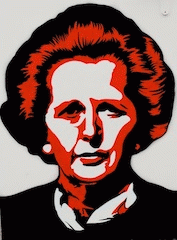Margaret Thatcher by Photo Bucket
As with so many deaths amongst politicians, the like-minded
flock, unified in the will to secure the body's immortality. For the sake of our
history books, I must trample down the proclaimed immortality of 'Thatcher's Privatisation Revolution', a mantra that is glowing neon-bright as her defining
achievement. Even The Economist has
failed to explore the hermeneutics of the idea, proving once again that
economists are not scientists if they let something like this slip by. In their
recent Eulogy, A Cut Above the Rest:
"Mrs Thatcher's privatisation revolution spread around the world. The post-communist countries embraced it heartily: by 1996 Russia had privatised some 18,000 industrial enterprises. India dismantled the licence Raj--another legacy of British Fabianism--and unleashed a cavalcade of successful companies. Across Latin America governments embraced market liberalisation. Whether they managed well or badly, all of them looked to the British example'.
http://www.economist.com/blogs/blighty/2013/04/margaret-thatcher-0
It will surprise no one to learn that Privatisation is simply an 'all-American' phenomenon. Thatcher had nothing to do with the concept or its widespread practice. The economic machinery behind the idea drafted by the young Turks in the brokerage houses of Lower Manhattan, not by the grocer's daughter born in Grantham. Simply put, this big idea - the original concept of privatisation, the inherent dollar possibilities of the mega merger, in fact the whole damn schlemiel - was originally conceived by a body of Goldman Sachs people, way back in the early 1960s.
The precursor to privatisation was the glimmer in the American eye to break into the business of Europe. The main event that allowed Goldman Sachs to extend its remit beyond its own corporate limitations was the Kennedy Tax Bill (1963). At the time the US balance of payments was under considerable strain; capital was flowing out of the country. It was a major concern in Washington who passed the Interest Equalisation Tax, a law that effectively prevented foreign companies coming to the States and borrowing and forcing American companies to borrow overseas to fund and finance new foreign operations.
The event of Interest Equalisation was significant for one reason. American companies were big. Too big. The biggest in the world. And somehow, they needed to get bigger. Corporations like General Electric, BF Goodrich, Corning, Kraft (names now lost over time), were challenging the best economic minds of the day, saying, "Hey look, we've won out in our domestic markets - what can we do about winning overseas?"
Michael Coles was a relatively lowly figure, minding his own business down in the basement of the Corporate Finance Department of a large brokerage house in New York. With interest equalisation however this bright, intensive young man envisioned pyrotechnically, the bright white light of a new kind of deal. Perhaps one of the biggest. A mega-deal grown in the US and delivered to the biggest client of the moment. The continent of Europe.
The concept he was selling was privatisation.
Michael Coles realised that he couldn't run this idea, this "deal' out of New York. To lend it credibility, he had to test the theory out himself. With the support of his bosses, he chose to start in London. He took with him as companion the high-profile economist 'Joe' Henry Fowler who had up until that time been President Linden Johnson's Secretary at the Treasury. Joe and Michael set off on a long trip around Europe to see what was really going on. The message they got in London was very very clear: "Nice to have you chaps here old boy but don't think you'll get any more business, we'll give you all the business you're ever going to get out of London'. While the big Merchant Banks looked unassailable and impervious to the men of ideas from New York, they hadn't reckoned on the Government of the Day lending an ear to the brassy Americans.
Enter Margaret Thatcher who held out-stretched arms for anybody trying to do investment banking business in London. Her metallic anima, a beacon for all American power brokers of the day. More than mere political greeter, she went further by matching the high-minded fiscal propositions of Joe Henry Fowler and Michael Coles by lowering personal tax rates in the UK.
Next Page 1 | 2 | 3 | 4 | 5 | 6
(Note: You can view every article as one long page if you sign up as an Advocate Member, or higher).






